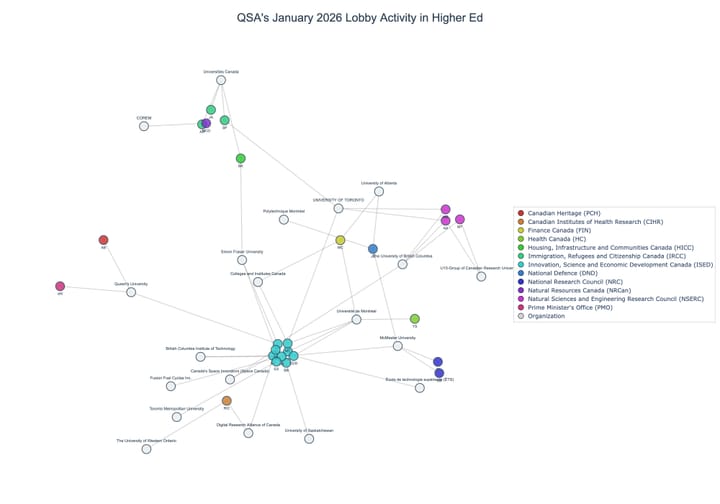QSA's Week in Higher Ed (#42, 2025)
Federal budget allocates $690M for research and Canada Research Chairs; CRTC details broadband/competition efforts; new climate satellite funding; US proposes major changes to EB-5 fees; NACIQI meeting rescheduled; AI strategy consultation launched.

Good morning! This is Queen Street Analytics' weekly roundup of regulatory developments, legislative discussions, political announcements and other government-related news concerning colleges, universities, campuses, research initiatives and funding, and the tri-council (CIHR, NSERC, SSHRC) agencies. Every Monday, we break down the most important updates in this space in under five minutes.
Want to see GR activities in areas of the economy related to the Higher Ed channel? Don’t miss this week’s updates in Social Issues and BioPharma.
Dates: 2025-10-19 to 2025-10-25
📋 In This Week's Newsletter
• 🏛️ This Week's Parliamentary Committee Calendar
• 🇨🇦 Canadian Federal GR News
• 🗺️ Canadian Provincial GR News
• 💬 Government Consultations
• 📚 What We're Reading This Week
This Week's Parliamentary Committee Calendar
- House Science and Research Committee Evaluates Private Sector R&D Investment – October 27 & 29: The House Committee on Science and Research will study private sector investment in research and development in Canada with hearings on October 27 and 29. On October 27, witnesses include representatives from the Balsillie School, MaRS Discovery District, Martinrea, University of Toronto, Niagara College, and U15 Canada.
- Canadian Heritage Committee Studies Impact of AI on Creative Industries – October 27 & 29: The Canadian Heritage Committee will hold sessions October 27 and 29 reviewing technological advances in AI and their effects on the creative industries. Witnesses include Michael Geist, UNESCO Chairholder Véronique Guèvremont, and leaders from media and AI research sectors.
- Health Committee Probes Immigration Policy Impact on Healthcare and International Credentials – October 28: On October 28, the Health Committee examines immigration policy’s effect on healthcare, focusing on barriers for internationally-trained professionals. Experts testifying include Dr. Scott Alexander, Rosemary Pawliuk (Society for Canadians Studying Medicine Abroad), and representatives from the Canadian Medical Foundation and Medical Council of Canada.
- Human Resources Committee Reviews Government Mandates and Youth Employment – October 28: The Human Resources, Skills and Social Development Committee (HUMA) discusses government mandates and youth employment October 28. Scheduled witnesses include officials from Employment and Social Development Canada, the Students Commission of Canada, and YMCA of Greater Halifax/Dartmouth.
Canadian Federal GR News
Federal Government Announces $690 Million for Science and Canada Research Chairs
On October 22, the Government of Canada announced over $690 million in new funding for research and innovation, with Minister Mélanie Joly outlining allocations toward the Tri-agency Institutional Programs Secretariat. More than $482 million will be provided via the Research Support Fund, managed by SSHRC on behalf of NSERC, CIHR, and SSHRC, supporting indirect costs at universities and colleges and enhancing research infrastructure, cybersecurity, and institutional capacity nationwide. Approximately $198 million will fund 259 new and renewed Canada Research Chairs, enabling teams across multiple disciplines including artificial intelligence, Indigenous governance, and health sciences. The Canada Foundation for Innovation is allocating nearly $11 million for 43 infrastructure projects at 27 institutions. Additionally, the 2024 Robbins-Ollivier Award for Excellence in Equity will distribute $300,000 among three institutions promoting barrier reduction in academia. This federal investment aims to strengthen Canada’s competitiveness in areas ranging from quantum sciences to ocean engineering, and follows recent shifts in the global research funding landscape.
Sources: Announcements: www.canada.ca

CRTC Outlines Recent Actions on Connectivity, Competition, and Broadcasting Modernization
In a keynote on October 20, CRTC Chairperson Vicky Eatrides reported on the Commission’s ongoing work to improve internet and cellphone service competition and affordability, particularly in rural and Indigenous communities. Eatrides detailed allocations exceeding $750 million since 2019 through the Broadband Fund, supporting internet or cellular projects in nearly 300 communities and constructing over 5,500 kilometres of fibre infrastructure. She highlighted the 2023 move to enable greater access to large telecoms’ fibre networks for internet resellers, resulting in new competitive offerings and noted early evidence of declining internet and cellular prices as new competitors expand. The CRTC has also begun consolidating consumer codes for telecommunications providers and issued decisions under the Online Streaming Act to support French-language content, Indigenous programming, and local news, including financial support mechanisms for local broadcasters. The modernization of regulatory frameworks for radio and new digital platforms continues, with several new regulatory decisions anticipated in the coming weeks.
Sources: Announcements: www.canada.ca
Government Funds $5.4M Arctic Climate Mission via Canadian Space Agency
On October 23, the Canadian Space Agency awarded over $5.4 million to ABB Inc. and Honeywell Canada for the High-altitude Aerosols, Water vapour and Clouds (HAWC) mission. The contracts fund design and critical technology development for the Thin Ice Clouds and Far InfraRed Emissions (TICFIRE) instrument, with the HAWC satellite intended to provide extensive data on Arctic atmospheric conditions. The mission supports improved forecasts for northern communities and climate adaptation strategies, and the Agency projects the funding will support the creation of more than 160 highly skilled jobs in research and engineering across Canada over the life of the project.
Sources: Announcements: www.canada.ca
Federal-Provincial Agreement Signed for French Minority-Language and Second-Language Education in Nova Scotia
On October 24, the governments of Canada and Nova Scotia formalized a bilateral agreement for minority-language and second-language instruction, covering 2024–2028. The federal investment of more than $48 million will support French-language education initiatives from pre-school through post-secondary. Nova Scotia will introduce additional matching investments under the agreement’s terms. This agreement renews a partnership model ongoing for over 50 years, supporting French minority and second-language educational programming at all levels in the province.
Sources: Announcements: www.canada.ca
Enabling Accessibility Fund Disburses Over $35M for Accessibility Projects Including Youth Component
The federal government, through Minister Patty Hajdu, announced $35 million under the Enabling Accessibility Fund on October 23 for 564 projects nationwide focused on enhancing accessibility infrastructure in workplaces and community organizations. The latest disbursement includes $34.3 million in the small projects stream and nearly $1.5 million for 159 youth-driven innovation projects that empower young Canadians to lead the design and delivery of accessibility upgrades. Supported initiatives span construction, retrofitting, and community space enhancement, and align with federal objectives to improve workforce inclusivity and community participation for persons with disabilities.
Sources: Announcements: www.canada.ca
Federal/Provincial-Funded Accessibility Initiatives Awarded in Post-Secondary and Community Settings
A detailed roster of projects funded under the 2024 Enabling Accessibility Fund Youth Innovation stream was released October 23, allocating grants across all provinces in amounts up to $12,000 per project. Award recipients include post-secondary institutions such as Acadia University, various community groups, and local governments, reflecting an ongoing gradual rollout of small-scale infrastructure and assistive technology upgrades. The program partners federal funding with local leadership from youth and non-profits.
Sources: Announcements: www.canada.ca
Speech from Minister Joly Covers Plan for Domestic Industrial Strategy, Research Talent, and Defence Investment Agency
In remarks delivered to business groups and chambers of commerce, Minister Mélanie Joly outlined a multi-pillar economic plan focusing on protecting domestic industries, creating jobs through defence procurement and infrastructure projects, and attracting research talent. Joly detailed the recent launch of a $5 billion Strategic Response Fund, investments in Canadian defence industry supply chains, and emphasized partnerships to stimulate major engineering, AI, and technology projects. The plan calls for a renewed focus on scaling Canadian firms, attracting international R&D investment, and simplifying permit processes. The Minister also noted a reinforced government commitment to support universities and scientific research to maintain Canada’s place in the global innovation landscape.
Sources: Announcements: www.canada.ca
Senate Committee Examines CBC/Radio-Canada’s Digital Strategy, Funding Challenges, and Use of AI
At the October 21 session of the Senate’s Transport and Communications Committee, CBC/Radio-Canada executives reviewed the organization’s strategy to expand local programming, leverage digital platforms, and manage competition with global platforms absorbing ad revenue from Canadian news outlets. Discussions covered cross-network collaborations, new digital offerings like podcasts, outreach to minority francophone communities, and the use of AI in news content workflows for data handling and combating misinformation. Funding uncertainties and protection of journalistic standards were also discussed.
Sources: Transcripts: senparlvu.parl.gc.ca
Senate Committee on Fisheries and Oceans Reviews Ocean Carbon Removal and Partnerships
The Standing Senate Committee on Fisheries and Oceans convened October 21 to evaluate ocean carbon dioxide removal (mCDR) initiatives and their research and economic implications. Federal officials and independent experts discussed ongoing policy gaps, the absence of scientific consensus on mCDR’s impacts, and the need for federally led research roadmaps. The session addressed the potential for public-private partnerships in developing ocean carbon removal projects, consultation with Indigenous communities, integration with adjacent industries, and the absence of robust economic viability data.
Sources: Transcripts: senparlvu.parl.gc.ca
Senate Committee Considers Age Verification Regulation and Data Privacy Practices
On October 23, the Senate Committee on Legal and Constitutional Affairs reviewed testimony from companies and researchers developing age-verification technology using AI and biometric analysis to limit minors’ exposure to adult content. Industry representatives presented technical solutions designed to comply with international data privacy regimes and minimize the risk of data breaches, while committee members probed for potential biases, the scope of Ofcom’s power under proposed legislation, and alignment with global age-verification trends.
Sources: Transcripts: senparlvu.parl.gc.ca
StatsCan Reports Modest Increase in Young Adult Education Participation Rate
Statistics Canada, in its October 24 release, notes the education participation rate among Canadians aged 18-24 rose to 49% in 2024/2025, compared to 47% a decade prior. The data reflect continued shifting enrolment at colleges and universities as institutions adapt to evolving labour market conditions and demographic trends. The underlying report signals continued mild upward pressure on post-secondary engagement for the age cohort.
Sources: Open Government Data Set: www.statcan.gc.ca
Canadian Provincial GR News
Manitoba Announces Over $4.5 Million for Indigenous Language Degree Programs
The Manitoba government will invest over $4.5 million at the University of Winnipeg and University College of the North for new degree programs in Indigenous language immersion, beginning January 2026. These programs will train new generations of fluent speakers for provincial classroom roles.
Sources: Provincial Announcement: news.gov.mb.ca
Ontario Allocates $8.6 Million for Women in Skilled Trades through SDF
Ontario announced new funding exceeding $8.6 million for programs supporting over 1,700 women in skilled trades via the Skills Development Fund. The investment includes bootcamps, apprenticeship supports, and partnerships with employers, colleges, and non-profit organizations.
Sources: Provincial Announcement: news.ontario.ca
Alberta Amends Post-Secondary Leadership Boards
The Government of Alberta made board appointments and reappointments to the boards of Mount Royal University, University of Lethbridge, Lethbridge Polytechnic, and Red Deer Polytechnic, with terms running through October 2028.
Sources: Provincial Announcement: www.alberta.ca
Alberta Prepares Legislation to Streamline Credential Recognition and Expand Health Agencies
Alberta’s government has outlined legislative priorities for the 2025 fall session, including bills to accelerate approval of internationally trained professionals’ credentials and changes to provincial health agency governance.
Sources: Provincial Announcement: www.alberta.ca
New Brunswick Speech from the Throne Details Education and Mobility Initiatives
New Brunswick’s speech from the throne reiterated plans to expand school nutrition programs, increase community care clinics by 2028, and introduce legislation to bolster interprovincial labour mobility.
Sources: Provincial Announcement: www2.gnb.ca
Government Consultations
Consultation Launched on Renewed Artificial Intelligence Strategy
Innovation, Science and Economic Development Canada began a consultation on October 1 to shape a renewed national AI strategy for 2026–2030, seeking input from stakeholders on research, commercialization, adoption, and governance priorities. The consultation period ends November 1, 2025.
Sources: Canadian Government Consultations: ised-isde.canada.ca
What We're Reading This Week
- International students rethink North American education as visa rules tighten and costs rise: International students and North American institutions adjust to new visa and affordability constraints.
- Ontario's new residency policy leaving some internationally trained doctors in limbo: Residency policy changes in Ontario present new hurdles for internationally-trained physicians.
- York University’s trailblazing Digital Technologies program: York University’s new program addresses demand for digital skills through experiential learning.
- U of T emergency fund offers ‘lifeline’ to researchers facing U.S. funding cuts: University of Toronto establishes emergency funding for researchers impacted by international grant restrictions.
- Nunavik residents share vision for post-secondary education in the region: Community-driven recommendations for northern Quebec’s higher education access.
- U of Winnipeg's 5-year strategic plan includes focus on research, reconciliation: The University of Winnipeg’s 2025–2030 strategy includes targets for research and Indigenous engagement.
- Opinion: Our universities need to ditch DEI and get back to merit and excellence: Commentary on changing the balance of diversity and merit in Canadian universities.
- The ‘sacrifices’ of Carney’s budget + These universities are scrapping white coat ceremonies: Budget constraints and changing commencement traditions at Canadian universities.
- The Canada Foundation for Innovation empowers Canada Research Chairs with research infrastructure support: Infrastructure funding enhances the research environment for Canada Research Chairs.
- 7 universities reject White House funding deal with attached demands. Multiple other schools have yet to respond: Several US-based universities turn down federal funding citing grant conditions.

